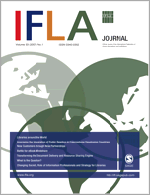Call for Papers: IFLA Journal special issue on Health Information transforming lives
15 October 2018
Submission Deadline: 30 November 2018

IFLA Journal and IFLA’s Health & Biosciences Section are pleased to announce a call for papers for a special issue focused on Health Information which will highlight the transforming effect of health libraries in underserved communities. Library outreach, in all its forms, requires that the librarians leave their own traditional space, enter someone else’s space, learn about the people occupying that space, and create a connection between the two. For health librarians wishing to connect with traditionally underserved and hard-to-reach populations, this requires not only learning about and appreciating the cultural differences that may distinguish those populations from the librarian, but also about the many health disparities that are likely to exist. For those who may be members of more than one traditionally underserved community, such as homeless people, this may also involve understanding and navigating multiple layers of discrimination and their effect on the person’s health, on their health information needs as well as their information behaviour.
The issue will include specific examples of such work, or which explore the theoretical aspects of such work that may inform and shape future efforts. It will also include exploring and demonstrating alternative ways of measuring impact beyond traditional scholarly metrics.
IFLA Journal invites papers for this special issue focused on health information and underserved communities from colleagues across all continents. The issue will be published in the Summer of 2019 as Volume 45 Issue 3. In particular, the main goal of the special issue is to gather the latest innovations, theories, research and practices from health information professionals to highlight the crucial role of health libraries and librarians in contributing to the health of their underserved communities in the 21st century.
Guest Editor:
Professor Maria G.N. Musoke
Deputy Vice Chancellor (Academic Affairs)
Kyambogo University, Kampala
Uganda
Topics of interest include:
Innovative ways health information professionals have reached out to the hard to reach areas in society
Examples of new and/or innovative projects that have been implemented by health information professionals to reach out to the hard to reach areas, giving evidence of what was learnt and demonstrating that a specified group of people was reached and supported. This should include evidence of results. Long viewed as safe spaces, libraries often serve as havens for homeless people and as hubs of service for impoverished communities. New roles undertaken by health information professionals should be highlighted.
Measurement of impact: traditional scholarly output metrics and emerging alternatives
What options are there for measuring the impact of medical/health research and scholarly publications, both traditional metrics and those that are emerging? Conventional bibliometric analysis of output can be complemented by metrics that assess the dissemination and impact of medical/health research through social media, usage of biomedical devices, disease epidemiology, and/or other methods that engage the public to improve health.
Information models or theories that highlight the role of health information in transforming societies
Researchers and academics in the field of health information/informatics working on emerging models or theories that are relevant to the theme. How do such models or theories advance our understanding, contribute to policy and/or practice to transform lives and societies in general?
Submission Deadline:
Articles for the special issue should be submitted to IFLA Journal for peer review before 30 November 2018.
How to Submit a Manuscript
IFLA Journal is hosted on ScholarOne™ Manuscripts, a web based online submission and peer review system SAGE Track. Please read the Manuscript Submission guidelines, and then simply visit the IFLA Journal Manuscript submission webpage to login and submit your article online.
IMPORTANT: Please check whether you already have an account in the system before trying to create a new one. If you have reviewed or authored for the journal in the past year it is possible that you will have had an account created.
All papers must be submitted via the online system. If you would like to discuss your paper prior to submission, please contact Steven Witt, Editor of IFLA Journal: swwitt@illinois.edu, or or Guest Editor Maria G.N. Musoke: maria.gnmusoke@yahoo.com.
For instructions on formatting your manuscript please consult the submission guidelines.
About IFLA Journal
IFLA Journal is an international journal publishing peer reviewed articles on library and information services and the social, political and economic issues that impact access to information through libraries. The Journal publishes research, case studies and essays that reflect the broad spectrum of the profession internationally. All articles are subject to peer review. Articles are published in English. Abstracts will be translated by IFLA (the International Federation of Library Associations and Institutions) into the other working languages of IFLA—Arabic, Chinese, French, German, Russian or Spanish—for publication.
IFLA Journal is published by Sage Publications and is the official journal of IFLA, and has an international readership consisting of academic institutions, professional organizations, and IFLA members who all receive a free subscription to the journal.
Each issue of IFLA Journal is made available Open Access upon publication on IFLA’s website. Authors are also encouraged to make the accepted version of their manuscripts available in their personal or institutional repositories.
IFLA Journal is indexed by the following databases:
- Abi/inform
- Academic Search Premier
- Business Source Corporate
- Compendex
- Current Awareness Abstracts
- IBZ: International Bibliography of Periodical Literature
- IBZ: International Bibliography of Periodical Literature in the Humanities and Social Sciences
- Information Science and Technology Abstracts
- Inspec
- Library Information Science Abstracts
- Library Literature & Information Science
- SciVal
- Scopus
- Sociological Abstracts
- Web of Science